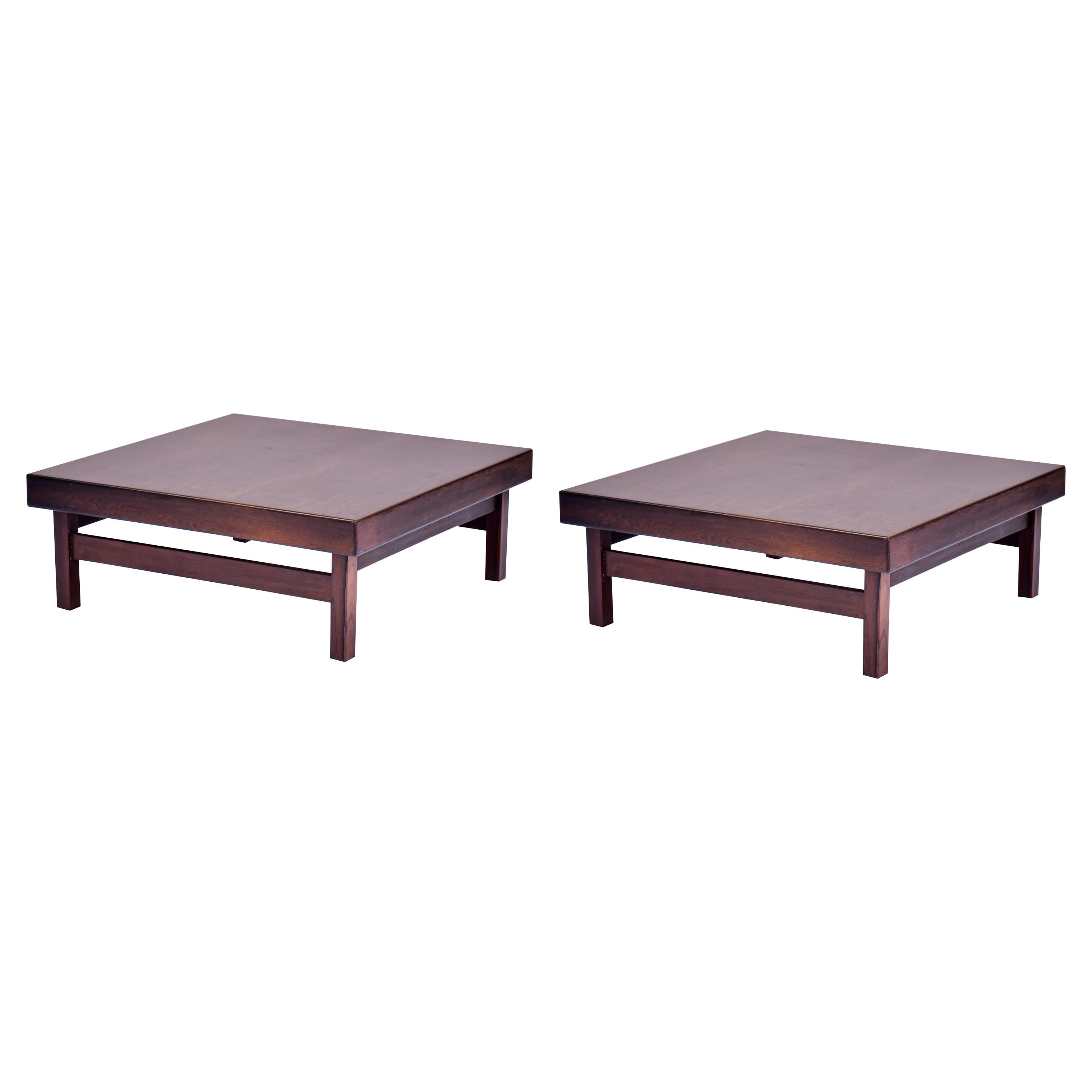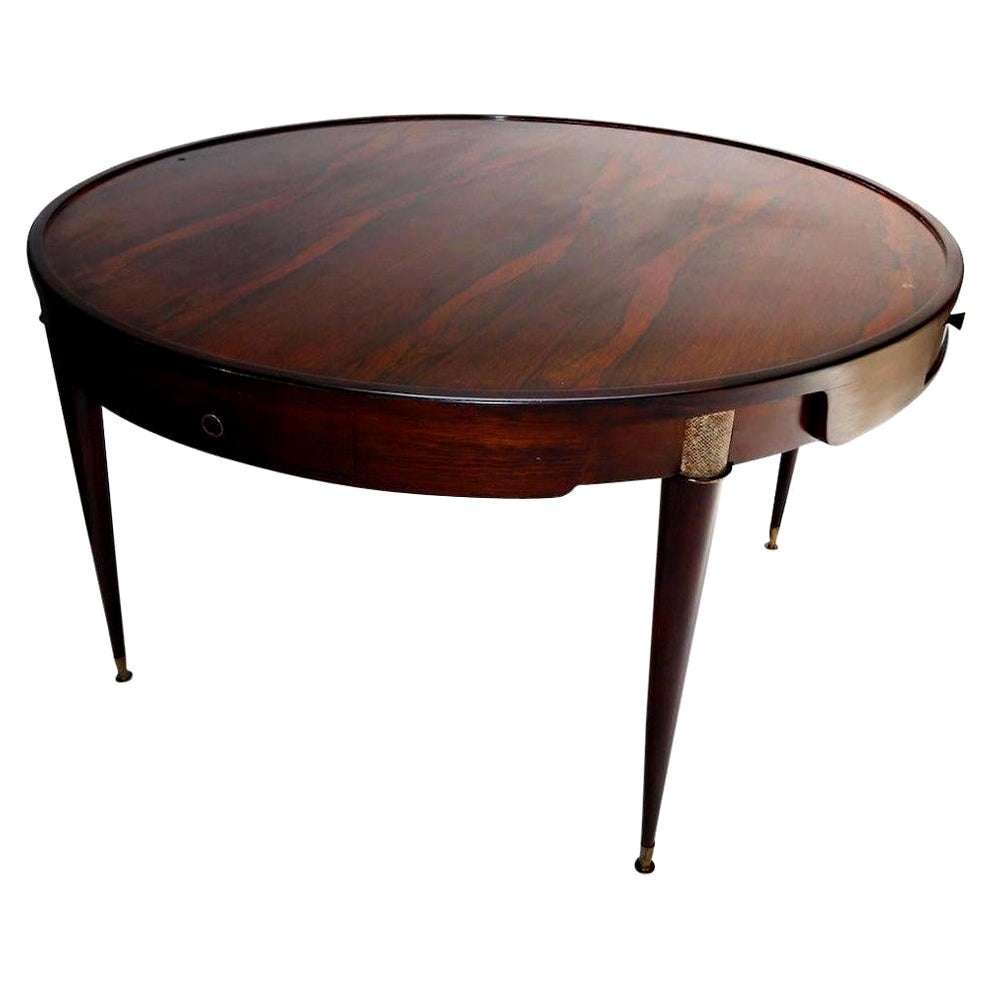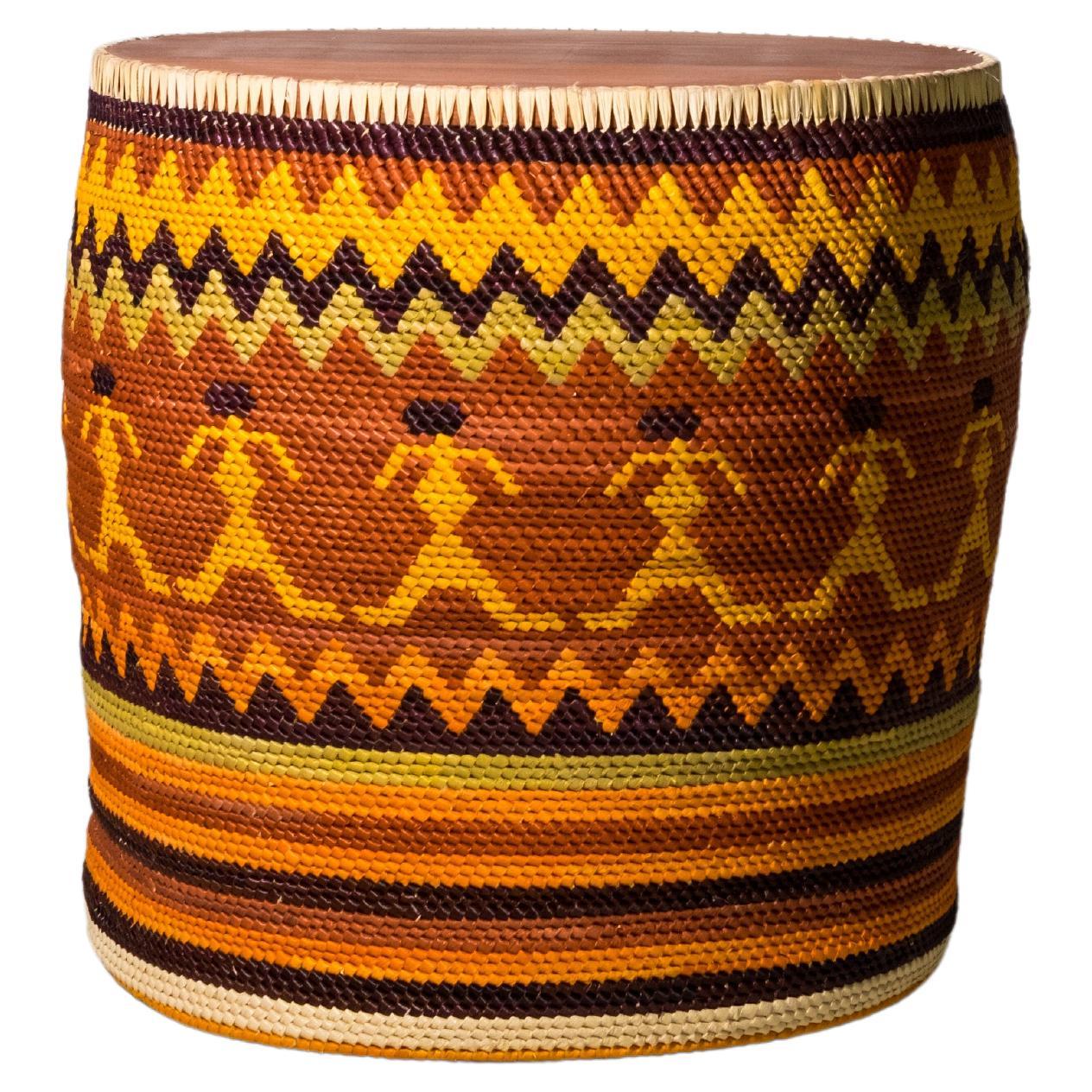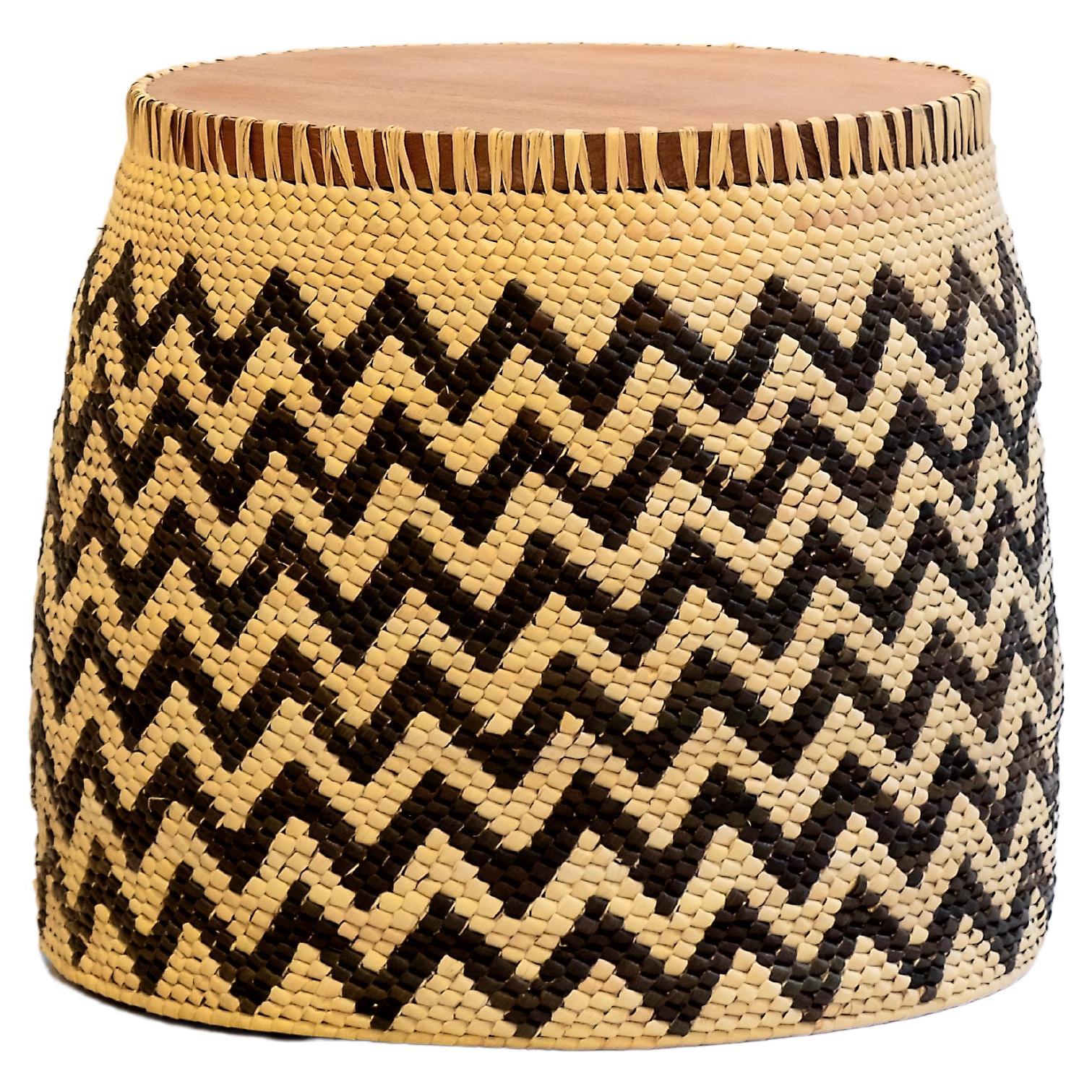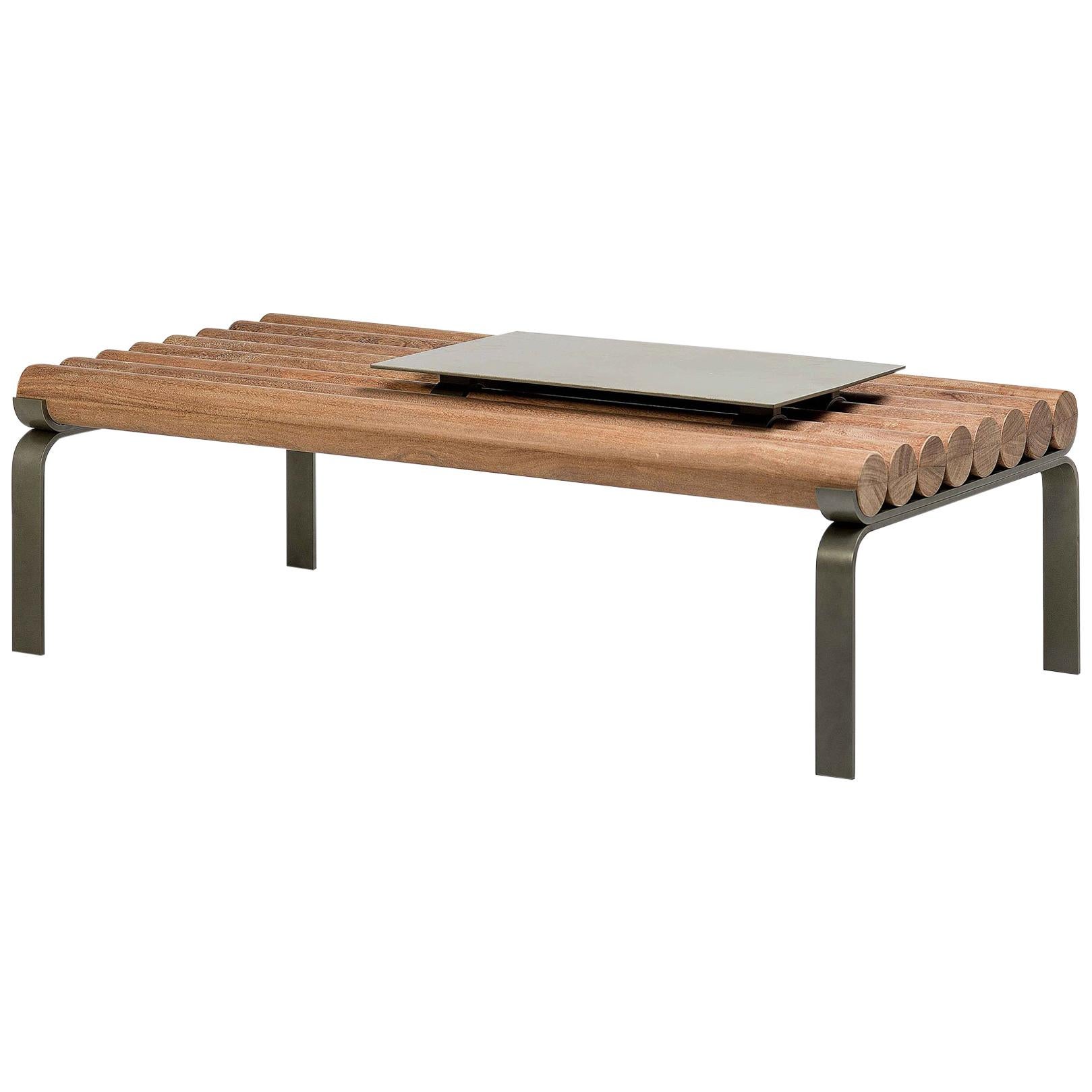Items Similar to Beijú Center Table: handcrafted in Brazil with beads and Cabreúva wood
Video Loading
Want more images or videos?
Request additional images or videos from the seller
1 of 10
Beijú Center Table: handcrafted in Brazil with beads and Cabreúva wood
About the Item
The Beiju Center Table is tribute to Mehinaku indigenous women. Made in Cabreúva wood it receives tiny beads necklaces made by them to be used in the traditional rituals of their people, in the Xingu Indigenous Territory, Mato Grosso, Brazil.
All Mehinaku traditions move me. The exchange system called Moitará, through which exchanges between villages are made, allows women to purchase ceramic pieces that are placed over the fire, supported on three bricks, to prepare their typical food, the cassava beiju. This moment was also honored at Beiju Center Table, with its top carved in solid cabreuva balanced on "wood bricks",
It is part of Yankatu's Xingu collection. To create it Maria Fernanda Paes de Barros researched the Mehinaku traditions, visited Kaupüna village for a short period of time before the pandemic and went through numerous immersions with the local artisans online.
As all the pieces produced by Yankatu, it is accompanied by its soul, a certificate of authenticity in the form of a small book that tells about the inspiration that gave birth to it and leaves blank pages so that its story can continue to be told by those who acquire it, turning it into something more, which does not change with fashion, which does not go by with time. To the contrary, it will move on from a generation to another, from hand to hand, each time with more stories to tell, each time incorporating the lives shared by it.
Developed in partnership with Mehinako artisans, in Alto Xingu, a line of products created by Maria Fernanda Paes de Barros arise from the meeting of the past and the future to build a new present.
It is amazing how vision, after immersive experiences in ancestral cultures, begins to have a greater sensitivity to see new ways of bringing our origin to the contemporary world. It is along this path that Maria Fernanda Paes de Barros, artist, researcher and founder of Yankatu, travels. With her soul absorbed by the profound experiences of the places she goes through, Maria Fernanda, in her own way, captures a dose of each learning experience, bringing to surface revelations in form of pieces filled with value, as a manifest for the benefit of Brazilian identity. “Each trip I make, I become humbler, I perceive differences from new angles, relearning to see and understand meanings through the other's place”, explains the artist.
For the new Xingu Collection, process could not be different; however, it had unusual circumstances in its development. The collection arose from the encounter between Maria Fernanda and the Mehinaku ethnicity, located in the Kaupüna village, in Upper Xingu, south of Amazon Forest, at the end of last year. “Xingu is born from an encounter between past and future, but is established in the present, proposing new ways of looking at tradition, with the respect and admiration that it deserves, while using technology to maintain communication in times of isolation ”, says Maria Fernanda, who, due to new practices since the beginning of pandemic in the world, was unable to return to Kaupüna village to continue the studies and production process.
This unprecedented protocol in the dynamics made Maria Fernanda find new ways of interacting with the village artisans. The weaving techniques classes that she would have in loco were transformed into recorded videos and sent over the internet; with the help of Kulikyrda Mehinako, an artist and one of the community representatives, Maria Fernanda developed a new color chart, extracted from leaves and barks of native trees found in the reserve, with the aim of rescuing the full potential of Xingu, counting on Maibe Maroccolo, in Brasília, to extract these shades and make dye pigments to color the cotton threads used on the mats produced by the Kaupüna village’s women.
To develop the pieces of the collection, Maria Fernanda was inspired by the objects and everyday elements of Mehinaku people.
The wood comes from nature, each one is unique, with its veins, knots and tones. Because it is a natural material it suffers with the climate change, so cracks and shifts in color may emerge over time. The wood can also warp sometimes due to a large variation in relative humidity of the air. This aren’t defects on the contrary, all of this is considered normal.
The work is accompanied by a certificate of authenticity.
Brazilian Contemporary and Collectible Design by Yankatu, design + art with Brazilian soul.
Prizes:
2022 - Créateurs Design Awards - Best Design Collection Nominee
- Creator:Maria Fernanda Paes de Barros (Designer)
- Dimensions:Height: 12.6 in (32 cm)Diameter: 49.22 in (125 cm)
- Style:Other (In the Style Of)
- Materials and Techniques:
- Place of Origin:
- Period:
- Date of Manufacture:2020
- Production Type:New & Custom(Limited Edition)
- Estimated Production Time:16-17 weeks
- Condition:
- Seller Location:Jundiaí, BR
- Reference Number:1stDibs: LU3188127387402
Yankatu - design with soul
My motivation comes from my soul and flows openly, on my life and in my work. I love what I do and I do it with intensity, I live every moment and I transmit all this emotion. In each project I immerse myself deeply in the region, in their craft and in the lives of the people who make them, it is a dive governed by research and by my soul, guided by the heart, done with respect and with the rhythm dictated by time. I get transformed and provoke transformations, and these atitudes reflect in the surroundings and beyond. I believe that design and art are one of the ways to value and eternalize the ancestral knowledge of Brazilian traditional crafts and the importance of nature around us, and so I use all tools that I have to create a quilt of infinite possibilities, full of feelings. Through Yankatu I expose not only my work, I bring with me the dreams and works of the artisans and instigate new dreams too. The tangible part of this work are the pieces that intertwine my touch with the lives that share their moments with me. The other part, immeasurable, is in continuous development, in a mixture of art and freedom, with no date to finish. It is a continuous development, in a relationship created around respect and trust. My desire, to be able to do this as long as I live.
About the Seller
No Reviews Yet
Vetted Seller
These experienced sellers undergo a comprehensive evaluation by our team of in-house experts.
Established in 2015
1stDibs seller since 2017
17 sales on 1stDibs
- ShippingRetrieving quote...Ships From: Jundiaí, Brazil
- Return PolicyThis item cannot be returned.
More From This SellerView All
- Halo Pendant - handmade in Brazil with cabreúva wood and feathersBy Maria Fernanda Paes de BarrosLocated in Jundiaí, SPIndirect light luminaire made in recycled peroba wood with intertwined feather flowers, providing soft lighting. Suspended by steel cables, the luminaire floats delicately in the air. Inspired by the feather headbands...Category
2010s Brazilian Other Chandeliers and Pendants
MaterialsReclaimed Wood, Feathers
- Brocado Cabinet: handmade in Brazil with cabreúva wood and embroidered glassBy Maria Fernanda Paes de BarrosLocated in Jundiaí, SPA multifunctional cabinet made in solid cabreúva wood with a timeless design that values Brazilian artisanal work. The traditional embroidery exudes the fabric and falls on the bron...Category
2010s Brazilian Other Vitrines
MaterialsCotton, Glass, Wood
- Contas Round Swivel Bookcase: handmade in Brazil with cabreuva wood and ceramicBy Maria Fernanda Paes de BarrosLocated in Jundiaí, SPAll the levels of this round bookcase, made of cabreuva hardwood, are permeated by buriti palms yarns with ceramic beads, creating different compositions depending on the angle we look at it. All the soft colored shades of the ceramic come from the clay itself, stones and plants of the Jequitinhonha Valley, a Brazilian region known by its traditional ceramic craftwork. The designer Maria Fernanda Paes de Barros spent some time there researching their art and the way they live. The inspiration to design this bookcase came from the curtains used to decorate their houses and also by the poetry written by Deuzani Gomes dos Santos, the artisan who received her in her home. It is part of the Records of Time collection, whose inspiration came from an immersion period lived by the designer Maria Fernanda Paes de Barros at the artisans community, Coqueiro Campo, researching the materials and the origins of this Brazilian traditional craftwork, listening to the valley's stories and learning the artisans way of living. This bookcase, and all the pieces produced by Yankatu are numbered and accompanied by its soul, a small book that tells about the inspiration that gave birth to it and leaves blank pages so that its story can continue to be told by those who acquire it, turning it into something more, which does not change with fashion, which does not go by with time. To the contrary, it will move on from a generation to another, from hand to hand, each time with more stories to tell, each time incorporating the lives shared by it. The wood comes from nature, each one is unique, with its veins, knots and tones. Because it is a natural material it suffers with the climate change, so cracks an shifts in color may emerge over time. The wood can also warp sometimes due to a large variation in relative humidity of the air. This aren’t defects on the contrary, all of this is considered normal. All the handmade details in this round swivel bookcase...Category
2010s Brazilian Other Bookcases
MaterialsBeads, Natural Fiber, Wood, Ceramic
- Palafitas side table M: handcrafted in Brazil with tucumã straw and solid woodBy Maria Fernanda Paes de BarrosLocated in Jundiaí, SPPalafitas side table is made of Imbuia or cabreuva wood and bring the Tucumã straw, a typical palm of the Amazon rainforest, stained with roots, leaves and fruits, and braided by the...Category
2010s Brazilian Other Side Tables
MaterialsNatural Fiber, Straw, Wood
- Palafitas side table S: handcrafted in Brazil with tucumã straw and solid woodBy Maria Fernanda Paes de BarrosLocated in Jundiaí, SPPalafitas side table is made of Imbuia or cabreuva wood and bring the Tucumã straw, a typical palm of the Amazon rainforest, stained with roots, leaves and fruits, and braided by the...Category
2010s Brazilian Other Side Tables
MaterialsNatural Fiber, Wood, Straw
- Palafitas Stool: handcrafted in Brazil with tucumã straw and solid woodBy Maria Fernanda Paes de BarrosLocated in Jundiaí, SPPalafitas side table is made of Imbuia or cabreuva wood and bring the Tucumã straw, a typical palm of the Amazon rainforest, stained with roots, leaves and fruits, and braided by the...Category
2010s Brazilian Other Stools
MaterialsNatural Fiber, Wood, Straw
You May Also Like
- Contemporary Handcrafted Center Table in Brazilian Hardwood by Leo StraussLocated in Atibaia, BRSolid wood, processed in large width and thickness dimensions, and it adds life to this piece of straight and modernist shapes. In its artisan production, traditional woodworking ...Category
2010s Brazilian Brutalist Center Tables
MaterialsHardwood
- Vianna's Center Table in Brazilian Wood by Sergio RodriguesBy Sergio RodriguesLocated in Sao Paulo, SPWe work with artisans who masterfully restore typical pieces from each period of our history, valuing their different preservation techniques. Teamwork has built this pioneering comp...Category
Vintage 1960s Brazilian Mid-Century Modern Center Tables
MaterialsWood
- 1960s Brazilian Jacaranda Wood Center / Card TableLocated in Los Angeles, CA1960s Brazilian center table in jacaranda wood and gold details. Can be used as a card or dining table. Glass not included.Category
Vintage 1960s Brazilian Mid-Century Modern Center Tables
MaterialsBrass
- "Toras" Center Table in Solid Wood, Arthur Casas, Brazilian Contemporary DesignBy Arthur CasasLocated in Sao Paulo, SPThis center table is made out of steel and solid Cumaru wood, a typical hardwood from the northern part of Brazil. Arthur Casas is surely one of the most prominent contemporary B...Category
21st Century and Contemporary Brazilian Center Tables
MaterialsWood
- Brazilian Midcentury Center Table in Rosewood and Glass, c. 1970Located in Rio De Janeiro, RJCoffee or center table with solid Brazilian rosewood structure and glass top of unknown modern design authorship.Category
Mid-20th Century Brazilian Mid-Century Modern Center Tables
MaterialsRosewood
- 19th Century Brazilian Peroba Wood Center Table, DiameterLocated in Atlanta, GAA Brazilian carved and painted peroba wood center table from the 19th century. This antique table from Brazil has a round-shaped top, over a plainly rounded skirt/apron, and raised o...Category
Antique 19th Century Brazilian Center Tables
MaterialsHardwood
